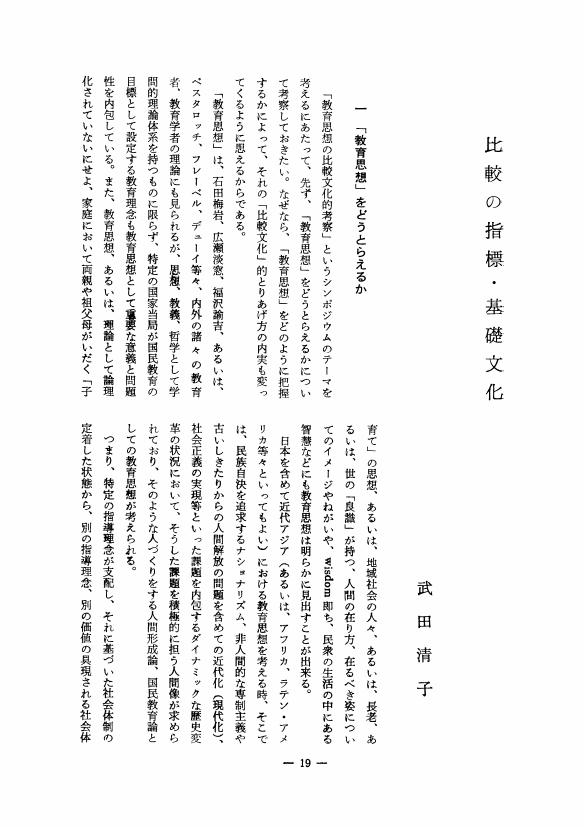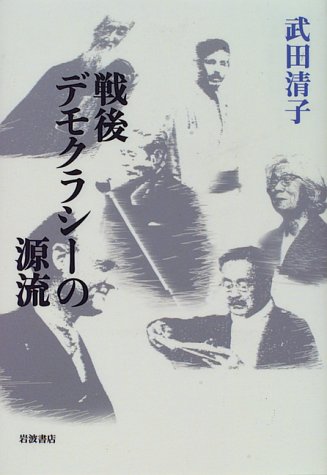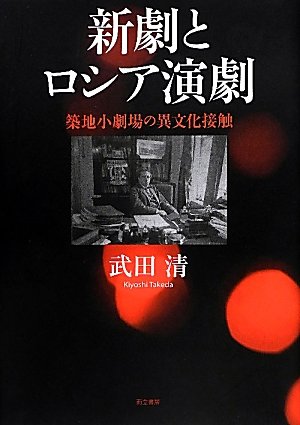1 0 0 0 OA 宮本武之助先生喜寿記念論集 『キリスト教と教育の接点』
- 著者
- 武田 清子
- 出版者
- 教育哲学会
- 雑誌
- 教育哲学研究 (ISSN:03873153)
- 巻号頁・発行日
- vol.1984, no.50, pp.90-94, 1984-11-10 (Released:2009-09-04)
1 0 0 0 OA 外国学界・教育界の動向 中国教育界のグリンプス
- 著者
- 武田 清子
- 出版者
- 教育哲学会
- 雑誌
- 教育哲学研究 (ISSN:03873153)
- 巻号頁・発行日
- vol.1981, no.44, pp.34-38, 1981-11-15 (Released:2009-09-04)
1 0 0 0 OA 比較の指標・基礎文化
- 著者
- 武田 清子
- 出版者
- 教育哲学会
- 雑誌
- 教育哲学研究 (ISSN:03873153)
- 巻号頁・発行日
- vol.1981, no.43, pp.19-24, 1981-05-10 (Released:2009-09-04)
1 0 0 0 OA “アジアの眼” でみた日本人
- 著者
- 武田 清子
- 出版者
- 教育哲学会
- 雑誌
- 教育哲学研究 (ISSN:03873153)
- 巻号頁・発行日
- vol.1973, no.27, pp.15-22, 1973-04-30 (Released:2009-09-04)
1 0 0 0 戦後デモクラシーの源流
1 0 0 0 新劇とロシア演劇 : 築地小劇場の異文化接触
1 0 0 0 IR メイエルホリドの俳優教育--ビオメハニカ再論
- 著者
- 武田 清
- 出版者
- 明治大学人文科学研究所
- 雑誌
- 明治大学人文科学研究所紀要 (ISSN:05433894)
- 巻号頁・発行日
- vol.48, pp.261-275, 2001-03
- 著者
- 柳町 美希 濱田 靖弘 花野 翔眞 板野 愉朋 武田 清賢 水馬 義輝 佐藤 英男 相馬 英明 佐伯 英樹 本間 富士夫
- 出版者
- 公益社団法人 空気調和・衛生工学会
- 雑誌
- 空気調和・衛生工学会大会 学術講演論文集
- 巻号頁・発行日
- vol.2016, pp.61-64, 2016
<p>This study aims to develop an operation control method for residential CHP (Combined Heat and Power) systems with BD (Buffer Device) and PV (Photovoltaics).</p>
- 著者
- 佐藤 博紀 濱田 靖弘 本間 富士夫 小川 まどか 花野 翔眞 板野 愉朋 武田 清賢 熊本 功 佐藤 英男 相馬 英明 佐伯 英樹
- 出版者
- 公益社団法人 空気調和・衛生工学会
- 雑誌
- 空気調和・衛生工学会大会 学術講演論文集
- 巻号頁・発行日
- vol.2015, pp.77-81, 2016
<p>This study aims to develop an operation control method for residential CHP (Combined Heat and Power) systems with BD (Buffer Device) and PV (Photovoltaics).</p>
- 著者
- 坂本 鷹彦 濱田 靖弘 本間 富士夫 高市 圭佑 佐藤 博紀 板野 愉朋 武田 清賢 熊本 功 佐藤 英男 相馬 英明 佐伯 英樹
- 出版者
- 公益社団法人 空気調和・衛生工学会
- 雑誌
- 空気調和・衛生工学会大会 学術講演論文集
- 巻号頁・発行日
- vol.2014, pp.77-80, 2016
<p>This study aims to develop the operation control method for residential CHP (Combined Heat and Power) systems with BD (Buffer Device) and PV (Photovoltaics). Simulation results of Smart House were evaluated by comparing PEFC to PEFC with Hybrid BD.</p>
1 0 0 0 OA 日本におけるキリスト教教育原理の問題の一齣 : 教育と宗教の衝突論争をめぐって
- 著者
- 武田 清子
- 出版者
- 国際基督教大学
- 雑誌
- 国際基督教大学学報. I-A, 教育研究 (ISSN:04523318)
- 巻号頁・発行日
- vol.1, pp.73-143, 1955
I. Preface: The purpose of this study is to seek an insight on Christian Philosophy of Education in Japan relation to the conflict between the traditional and nationalistic concept of man and the Christian concept of man. II. The ethical question raised by the early Protestants. Criticism of the Confucian ethics on which the feudalistic and Tennoistic social and ethical structure was founded, at the same time introducing the points made by Hiromichi Kozaki's "New Essay on Politics and Religion," and Naomi Tamura's "Christianity and Politics." III. The Shimmin Education (education to mold the people. as the subjects of the Emperor) propagated by the nationalists. The educational thought of the leading nationalistic edu. cators (such as Arinori Mori, Nagazane Motoda and Shigeki Nishimura), who on the basis of Confucian ethical teaching sougnt to make the Emperor the ethical as well as political head. of paternalistic family-nation. IV. The controversy between national education and Christianity. 1) The criticism of Christianity made by the outstanding nationalistic scholar, prof. Tetsujiro Inoue of Tokyo Imperial University. 2) The criticism of Christianity made by Buddhists. 3) The refutation by the Christians, both the Catholics and the Protestants. V. Some problems of Christian Philosophy of Education in Japan. 1) Problem of the authority of nation and Emperor. 2) Loyal and filial piety as the foundation of ethics. 3) The problem of concept of man "to be as a part" or "to be as oneself."
1 0 0 0 OA 日本におけるキリスト教 教育原理の問題の一齣 : 教育と宗教の衝突論争をめぐって
- 著者
- 武田 清子 タケダ チョウ キヨコ Kiyoko Takeda Cho
- 雑誌
- 国際基督教大学学報. I-A, 教育研究 = Educational Studies
- 巻号頁・発行日
- vol.1, pp.73-143, 1955-05-30
I. Preface: The purpose of this study is to seek an insight on Christian Philosophy of Education in Japan relation to the conflict between the traditional and nationalistic concept of man and the Christian concept of man. II. The ethical question raised by the early Protestants. Criticism of the Confucian ethics on which the feudalistic and Tennoistic social and ethical structure was founded, at the same time introducing the points made by Hiromichi Kozaki's "New Essay on Politics and Religion," and Naomi Tamura's "Christianity and Politics." III. The Shimmin Education (education to mold the people. as the subjects of the Emperor) propagated by the nationalists. The educational thought of the leading nationalistic edu. cators (such as Arinori Mori, Nagazane Motoda and Shigeki Nishimura), who on the basis of Confucian ethical teaching sougnt to make the Emperor the ethical as well as political head. of paternalistic family-nation. IV. The controversy between national education and Christianity. 1) The criticism of Christianity made by the outstanding nationalistic scholar, prof. Tetsujiro Inoue of Tokyo Imperial University. 2) The criticism of Christianity made by Buddhists. 3) The refutation by the Christians, both the Catholics and the Protestants. V. Some problems of Christian Philosophy of Education in Japan. 1) Problem of the authority of nation and Emperor. 2) Loyal and filial piety as the foundation of ethics. 3) The problem of concept of man "to be as a part" or "to be as oneself."
1 0 0 0 戰爭と平和について
- 著者
- 關根正雄 松木治三郎 武田清子著
- 出版者
- 新教出版社
- 巻号頁・発行日
- 1950
1 0 0 0 日本文化のかくれた形 (かた)
- 著者
- 加藤周一 木下順二 丸山真男 [著] 武田清子編
- 出版者
- 岩波書店
- 巻号頁・発行日
- 1984
1 0 0 0 横浜バンドの女性観 : 『日本の花嫁』事件をめぐって
- 著者
- 武田清子著 明治学院大学キリスト教研究所編
- 出版者
- 明治学院大学キリスト教研究所
- 巻号頁・発行日
- 1997
1 0 0 0 人間観の相剋 : 近代日本の思想とキリスト教
- 著者
- 武田 清
- 出版者
- 明治大学図書館
- 雑誌
- 図書の譜 (ISSN:1342808X)
- 巻号頁・発行日
- no.13, pp.71-77, 2009-03
1 0 0 0 IR ペスタロッチ受容の方法と問題 : 高嶺秀夫と石井十次・留岡幸助の人間把握の対比をめぐって
- 著者
- 武田 清子
- 出版者
- 国際基督教大学
- 雑誌
- 国際基督教大学学報. I-A, 教育研究 (ISSN:04523318)
- 巻号頁・発行日
- vol.9, pp.1-54, 1962-12
In the history of modern Japanese educational thought, the Pestalozzian movement was once influential throughout the nation. This was during the Meiji period. Originally Pestalozzi had a unique structure of thought composed of a profound understanding of man based upon Christian concepts (though he was influenced by Rousseau), a deep interest in helping poor children to realize their true humanity in spite of the distorted conditions of their existence, and a new educational method or technique of accomplishing this. However the technique of Pestalozzianism has often been adapted without the underlying philosophy of concern for humanity. Takamine Hideo, a graduate of Fukuzawa's Keio and later a principal of Tokyo Normal School and promoter of Pestalozzianism, was educated at Oswego Normal School which had adapted "Pestalozzianism" with its special emphasis on the method of "object lessons ". This method was introduced through England which had a unique emphasis on pedagogical techniques, and whose methods easily spread all over America in the time of industrial growth after the Civil War. In this paper I intend to re-examine and analyze the nature and problem of the type of liberal education which was labeled as the "Pestalozzian movement" and which was regarded as contradictory to nationalistic education in modern Japan, but which as a technical method of education, having been cut off from its spiritual root, was rather easily integrated with the moral education based upon Confucianism and Emperor worship and with the Japanese mythical view of history. I also contrasted this kind of adaptation with the educational thought of two Japanese Christian educators: Ishii Jyuji, the founder of the Okayama Orphanage, and Tomeoka Kosuke, the founder of the "family school" for juvenile delinquency, who in their understanding of man, their basic motive and method of education had much in common with that of Pestalozzi, although they have been almost entirely neglected in the history of modern educational thought in Japan.
1 0 0 0 OA 大正デモクラシーにおける"人間" : 吉野作造の思想をめぐって
- 著者
- 武田 清子
- 出版者
- 国際基督教大学
- 雑誌
- 国際基督教大学学報. I-A, 教育研究 (ISSN:04523318)
- 巻号頁・発行日
- vol.8, pp.34-71, 1961-12
The Democratic movement of the Taisho period (1912-1925) is one of the most important movements in the development of the democratic trends in modern Japan. The generation who served as the national leaders during the establishment of postwar democracy in Japan were the products of this movement who struggled and survived the pressure of the militaristic fascism. Thus Japanese postwar democracy was not a gift of the US Occupation but was a national product from within. Sakuzo Yoshino, a Christian professor of political science and leading democrat, was the central figure of this movement. Under the Meiji constitution, without denying the Emperor System he worked for the right of the people as much as possible within that framework, having been attacked on both sides by the extreme nationalists and the extreme leftists. First of all, I would like to study and analyze the nature of this attempt of democracy. Secondly, this period is called, at the same time, a period of humanism when Christianity took root in the cultural and social soil of Japan. Having been received within the bosom of the culture and even losing itself in it, Christianity sought to bring about a renewal of the common man and society. The individuals of this type were Inazo Nitobe, Toyohiko Kagawa, and Sakuzo Yoshino. In Yoshino the basis of democracy was definitely Christian faith, and particularly Christian concept of man. I would like to evaluate the understanding of "Man" and its role as the basis of Taisho Democracy.








